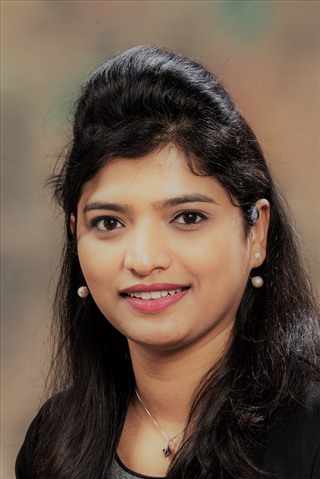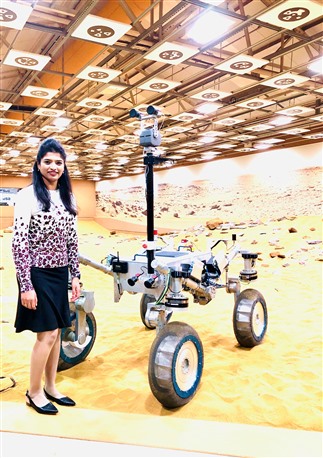Join us as we embark on "A Day in the Life of an Engineer." Through this blog series, we aim to inspire, inform, and celebrate the remarkable individuals who are shaping our world one innovation at a time. Whether you're a fellow engineer, a student aspiring to enter the field, or simply curious about the fascinating world of engineering, these posts will offer a glimpse into the passion, ingenuity, and relentless pursuit of excellence that define the life of an engineer.
For the first in this series we spoke to Dr Mamatha Maheshwarappa MSc PhD MIET, to find out more about a day in her life as an Aerospace Engineer at the UK Space Agency.

What is your name and job role?
My name is Mamatha Maheshwarappa. I’ve been an engineer for over twelve years. At the moment, I work for the UK Space Agency, an executive Agency of the Department of Science, Technology, and Innovation (DSIT), where I am the Payload Systems Lead within the Office of the Chief Engineer.
Why work for the Space Agency?
I chose the Space Agency because I am technically minded, my skills and experience gave me confidence that I was a perfect fit for the Payload Lead. Before arriving in the UK to study for my Masters and PhD, I worked at the Indian Space Research Organisation.
The heart of the industry was where I wanted to be, with the opportunity to drive decisions and create a vision for the sector, while developing on a professional level. I enjoy working with a variety of people; from academia, industries and other governments, for example, including the European Space Agency and NASA.
Daily responsibilities
I lead the Payload Systems discipline within the Office of the Chief Engineer, where I provide technical leadership on various UKSA programmes and projects, by offering technical oversight/assurance. Beside this, I support team development to meet the evolving requirements of the UK Space Agency and the wider UK Government.
When not doing that, I set out expert, technical advice and recommendations to senior officials within government. Beside this, I represent the UK at key international forums, where I support policy negotiations and take part in expert working groups.
Women in Aerospace Europe
I co-chair the Women In Aerospace-Europe (WIA-Europe)’s UK Committee, a non-profit organisation originating in the US. In 2016 a UK Committee of WIA was created and I’ve been part of it ever since, taking over as Co-Chair in March 2023. We organise monthly events to attract diverse talent into the sector. The next event in the calendar is at RAL space, with the Director of RAL space, Sarah Beardsley, discussing her own career journey.
Later, we will be hosting a panel event at the UK Space Conference, on bringing diversity and inclusion into the workforce.
Projects and assignments
At the moment, I have an oversight on national instruments such as NASA’IMAP, Lunar Trailblazer alongside the European Space Agency’s SMILE, ARIEL and COMET-I. Recently, I worked on other bilateral missions such as HelioSwarm and Litebird. My team also supports the International Space Station payloads and projects within National Space Innovation Programme (NSIP). Meanwhile, I am the technical lead on Space Based Solar Power.
Exciting upcoming projects
The project I’m most excited about is Space Based Solar Power (SBSP). The plan is to have huge structures that are kilometres wide in space harvesting solar energy, sending it back to Earth and connecting it to the power grid. It’s not a new concept, it was patented in the late sixties or early seventies. While technically possible back then, it was not economically feasible because launching anything into space was expensive. Now, with recent developments in technology and private space programmes such as Space X, it’s not so expensive to build structures and launch something into space.
As it is, our energy demand is expected to increase fourfold by the end of the century, while recent events around the world have raised concerns over energy security. Most importantly, to achieve carbon neutrality, studies suggest 90% of all energy must be from renewable or nuclear sources.
The UK Space Agency is interested because this could provide sustainable energy, help meet the government’s net-zero target and provide energy security. The Agency along with the Department for Energy and Net Zero (DESNZ) are supporting Space Based Solar Power at different stages to accelerate development of the technology.
The cost implications have always been out of this world. With rapid advances in lightweight solar panels, wireless power transmission technology, and lower-cost commercial space launches, the budget could be within reach. As it is, up to £6 million is available through grants to academia and industry to look at the feasibility of the technology. We’re at a really early phase at the moment, but there is a lot of potential.
Achievements and Rewards
I’ve made it through the highly competitive Future Leaders Scheme, and I “think” I am the only one from the UK Space Agency in this cohort.
Future Leader Scheme
This is a Civil Service leadership training programme, which lasts between 18 and 24 months and awards a certificate at the end. I was really thrilled to be accepted as part of it. There are also other tailored training programmes; META (for minorities) and DELTA (for disability).
Award as reward
I lead the Space Based Solar Power Project, where I have just received an award for going ‘above and beyond’ in my work on the enterprise. It’s been my assignment since I joined the UKSA. I provide consultancy work to other directorates, am the monitoring officer/ project manager looking after various aspects of the project. I liaise with the overall Department for Science, Innovation and Technology, Department for Energy Security and Net Zero and international partners such as the European Space Agency. I played a larger role than simply my own job. This was recognised by senior leadership.
Above and Beyond
Would I like to go into space myself? Absolutely yes! Like many who work for the Space Agency, I wanted to be an astronaut and applied for the training programme at every opportunity. But I’m really enjoying my role and career journey so far and love working with the enthusiastic and brilliant people in the industry.
I have been to the Mars Desert Research Station (MDRS) in Utah, USA (Mars Analogue). I had to write a science case to be able to go there. It meant collaborating with a professor from the University of Westminster to write a proposal for a team of engineers, scientists and geologists to embark on a two week ‘mission’. The site was completely deserted, so really felt like Mars.
Closing Thoughts
What I enjoy most about being an engineer in my field is building space hardware, and now in my current role supporting other organisations in developing new technologies for space applications.
I would say to aspiring engineers, follow your passion. If you are passionate about something you go an extra mile and enjoy your work and that is very important, be it for an engineer, doctor, lawyer, policy maker, or a project manager.
If you would like to find out more about life as an Engineer at the UK Space Agency, the IET Solent Network are hosting an event My Journey in the UK Space industry at the National Oceanography Centre in Southampton UK on 18th October, where Heidi Thieman of the Space Skills Alliance and Dr Maheshwarappa will talk about the results of the Space Sector Skills Survey, how the sector is changing and more about the Space based Solar Power Project.
#lifeofanengineer
